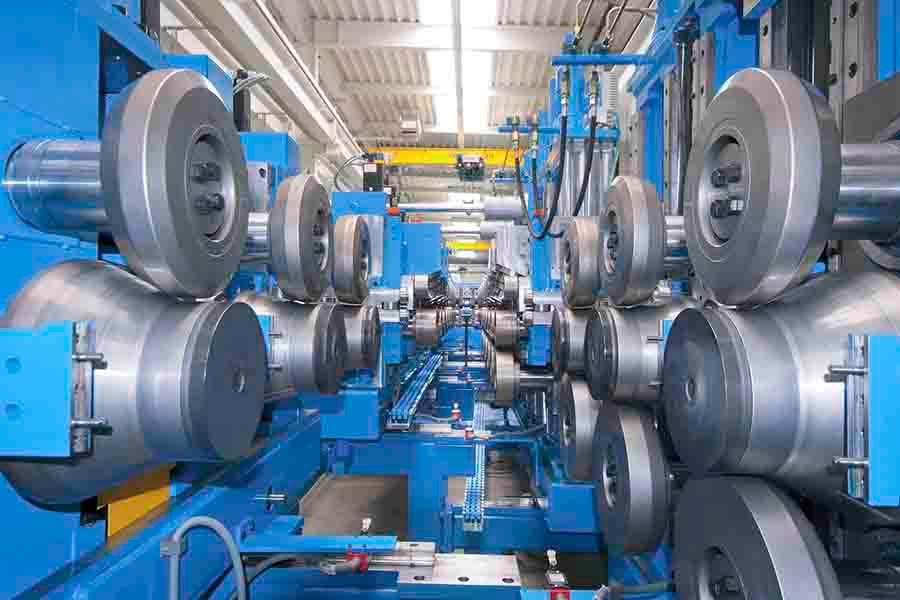
The Russian Federation is an important player in the global energy and infrastructure arena with its geopolitical position, huge territories and rich natural resources. Recent political and economic developments have pushed Russia to take important steps towards increasing self-sufficiency and strengthening local production in strategic sectors. In this context, the strategic importance of roll forming machines in large-scale projects implemented in the infrastructure and energy sectors is increasing.
Russia's Infrastructure and Energy Goals
Russia has set ambitious targets in various areas, especially in energy, transportation, housing and industrial infrastructure. These goals are aimed at increasing the country's economic development and resilience to external shocks:
- Energy Independence and Diversification: Although Russia is one of the world's leading energy producers, it aims to further consolidate its energy independence and find new markets in energy exports, especially due to recent sanctions and changing global energy balances. This stimulates the construction of new pipelines, power plants and renewable energy facilities.
- Infrastructure Modernization and Expansion: The need to modernize and expand transportation networks (rail, road, sea and air) continues in Russia's vast geography. In addition, urbanization and industrial development necessitate the construction of new residential, commercial and industrial buildings. Huge projects in the Arctic region require new infrastructure solutions.
- Import Substitution and Localization: Russia implements a comprehensive import substitution policy, especially with the aim of reducing dependence on Western technologies and products. This policy aims to increase the production capacity and technological capabilities of the local industry. This is driving the demand for roll-forming technology in local parts and component production.
The Role of Roll Forming Machines in Infrastructure Projects
Russia's vast geography and harsh climatic conditions require durable, fast and cost-effective solutions in infrastructure projects. Roll forming machines play an important role in meeting these requirements:
- Railway and Road Infrastructure: In the modernization of Russia's huge railway networks and the construction of new highways, components such as roll-formed barriers, tunnel support profiles, drainage systems and signaling poles are of vital importance. In particular, solutions that are resistant to cold climates and can be installed quickly are sought.
- Residential and Commercial Buildings: Light steel structure (LSF) systems are increasingly preferred in the construction of residential and commercial buildings quickly and economically in Russia. Roll forming machines accelerate the construction processes by producing the main carrier profiles (C, Z, U profiles) of these systems with high precision and in series.
- Storage and Logistics Facilities: Roof and façade systems (trapezoidal sheets, outer surfaces of sandwich panels) used in large warehouses and logistics centers built in line with the goal of increasing the logistics capacity of the country are produced with roll forming technology. In addition, shelf systems and carrier profiles used in interior configuration are also important application areas of roll form.
The Critical Importance of Roll Forming Machines in Energy Projects
Russia's energy sector is the scene of large-scale projects, both in terms of the extraction and transportation of traditional hydrocarbon resources and investment in renewable energy sources. Roll forming machines play a critical role in the successful execution of these projects:
- Pipelines and Support Structures: Russia's network of natural gas and oil pipelines is one of the largest in the world. The supporting structures, fixing elements and protective profiles of these lines are produced by roll forming. Especially in difficult geographies such as the Arctic, high-quality profiles are needed for the durability and safety of pipelines.
- Solar Power Plants (SPP): Russia is increasing its investments in renewable energy sources. Solar panel carrier constructions (C, Z and special form profiles) used for solar power plants are produced with roll forming machines, ensuring that the panels are mounted robustly and efficiently. Import substitution policies encourage local production of such components.
- Wind Power Plants (WPP): Roll form profiles are used for some components and internal structures of the support structures of wind turbines. In particular, the ladders, platforms and other auxiliary structures inside the turbine towers are produced with roll forming, providing ease of assembly and structural integrity.
- Nuclear Power Plants (NPP): In large nuclear power projects such as Akkuyu NPP, roll-form profiles are used for the auxiliary buildings of the power plant, cable carrier systems and various supporting structures. High safety standards require precision and quality production in these projects.
Opportunities and Challenges for the Russian Market
Russia's growing appetite for investment in infrastructure and energy projects offers significant market potential for roll-forming machine manufacturers. However, the current geopolitical situation and sanctions bring with them some challenges. While the direct participation of Western producers may be limited, significant opportunities arise for producers from Turkey, China and other Eastern countries. It is of great importance for companies that want to enter the Russian market to understand local needs well, to offer competitive prices and to establish a reliable network in the supply of after-sales technical support and spare parts.
Result
Russia's strategic importance in the infrastructure and energy sectors, as well as its large-scale investment plans, make rollforming machines a fundamental part of this country's development vision. Import substitution policies and targets to increase local production will further peometer the demand for roll-forming technology. As Russia's efforts to strengthen its self-sufficiency and energy independence continue, rollforming machines will continue to play a key role in this country building a sustainable energy future with a modern and resilient infrastructure.
